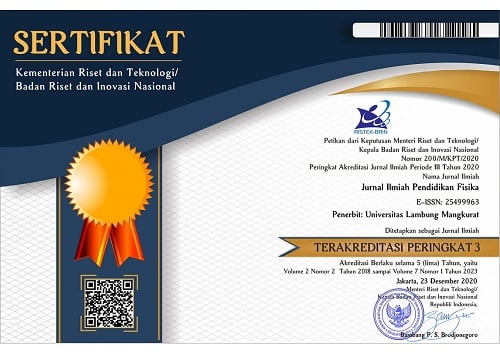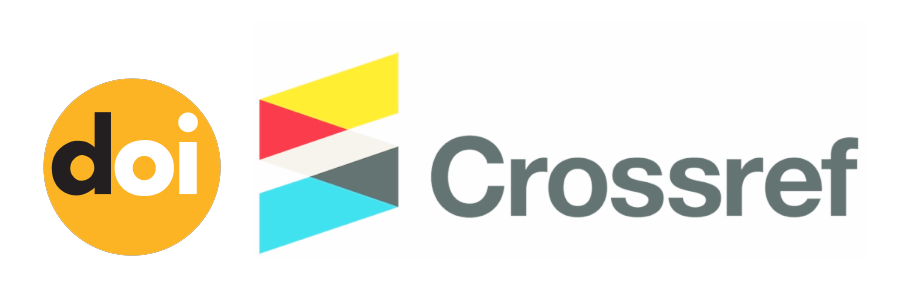Feasibility of Student Worksheets based on Critical Thinking Skills on the Topic of Heat and Temperature
Abstract
In the industrial era 4.0, critical thinking is indispensable in dealing with various daily life problems. However, these skills are less practised in schools. Therefore, this study aims to produce feasible worksheets to train students' critical thinking skills on temperature and heat. Five worksheets are developed: solid expansion, liquid expansion, gas expansion, heat and Black's principle. The research design used Tessmer's formative evaluation, including self-evaluation, expert review, individual trials, small group trials, and field trials. The validity of the worksheet was obtained through assessment by three experts and two science learning practitioners. Individual tests on three students, small group tests on nine students, and field tests on 32 students. The results showed: (1) the worksheets are valid because the results of content and construct validation on the five worksheets are 91.88; 92.81; 93.44; 93.75; and 92.81 with very valid categories; and (2) the worksheets are feasible because the content, expected, and actual feasibility scores are 84.44; 87.62, and 86.41 respectively with very good categories. Thus, the worksheets are feasible to use in science learning. These worksheets can be an alternative for educators in increasing the activity of students to improve learning outcomes, especially critical thinking.
Keywords
Full Text:
PDFReferences
Afandi, A,, Junanto, T., & Afriani, R. (2016). Implementation of digital age literacy in 21st century education in Indonesia. Science Education National Seminar . 113-120. Surakarta, 22 October 2016: UNS .
Berestova, A., Kolosov, S., Tsvetkova, M., & Grib, E. (2022). Academic motivation as a predictor of the development of critical thinking in students. Journal of Applied Research in Higher Education, 14 (3), 1041-1054.
Budi, A. S., Sari, S. W., Sanjaya, L. A., Wibowo, F. C., Astra, I. M., Puspa, R. W., Misbah, M., Prahani, B.K., & Pertiwi, W. A. (2021). PhET-assisted electronic student worksheets of physics (eSWoP) on heat for inquiry learning during covid. Journal of Physics: Conference Series, 2104(1), 012030. IOP Publishing.
Dewantara, D., Mahtari, S., Misbah, M., & Haryandi, S. (2019). Student responses in biology physics courses use worksheets based on scientific literacy. Prisma Sains: Jurnal Pengkajian Ilmu dan Pembelajaran Matematika dan IPA IKIP Mataram, 7(2), 192-197.
Ennis, RH (1995). Critical thinking . New Jersey: Upper Saddle River.
Fardani, Z., & Edy, S. (2017). Improving critical thinking skills in learning mathematics to build national character. Journal of Mathematics Education (online), 2 (2) , 1-6.
Gani, H., Arifin, Y. F., & Zaini, M. (2022). The feasibility of android-based modules on the critical thinking skills of high school students. Journal of Banua Science Education , 2 (2), 99-108.
Haqsari, R. (2014). Development and analysis of multimedia-based E-LKPD (electronic-student worksheets) on operating material spreadsheet software. Yogyakarta State University , 53, 1689-99.
Hartini, S., Mariani, I., Misbah, M., & Sulaeman, N. F. (2020, June). Developing of students worksheets through STEM approach to train critical thinking skills. Journal of Physics: Conference Series, 1567(4), 042029. IOP Publishing.
Hidayanti, R., Alimuddin, A., & Syahri, AA (2020). Analysis of critical thinking skills in solving mathematical problems in terms of gender differences in class VIII students. 1 State Middle School 2 Labakkang. SIGMA: Journal of Mathematics Education, 12 (1), 71-80.
Hsu, F. H., Lin, I. H., Yeh, H. C., & Chen, N. S. (2022). Effect of Socratic reflection prompts via video-based learning system on elementary school students' critical thinking skills. Computers & Education, 183, 104497.
Inganah , S., Darmayanti, R., & Rizki, N. (2023). Problems, solutions, and expectations: 6c integration of 21 st century education into learning mathematics. JEMS: Journal of Mathematics and Science Education, 11 (1), 220-238.
Islamia, N. (2019). Development of student worksheets based on critical thinking skills as teaching materials for biology subjects (Doctoral dissertation, UIN Raden Intan Lampung). Unpublished.
Ministry of Education and Culture. (2017). Guidelines for implementing 21st century skills in the 2013 curriculum in senior high schools . Jakarta: Directorate General of Primary and Secondary Education.
Lumbantoruan, A., & Jannah, N. (2019). Description of students' attitudes toward physics. SPECTRA: Journal of Science Education Studies, 5 (2), 161-172.
Maharani, K., Mahtari, S., & Suyidno, S. (2021). Improving scientific creativity and scientific attitude of students through creative responsibility based learning on energy-work materials during the covid-19 pandemic. Prisma Sains: Journal of the Study of Science and Learning Mathematics and Science IKIP Mataram, 9 (2), 325-335.
Mahtari, S., Wati, M., Hartini, S., Misbah, M., & Dewantara, D. (2020). The effectiveness of the student worksheet with PhET simulation used scaffolding question prompt. Journal of Physics: Conference Series, 1422(1), 012010. IOP Publishing.
Misbah, M., Dewantara, D., Hasan, S. M., & Annur, S. (2018). The development of student worksheet by using guided inquiry learning model to train student's scientific attitude. Unnes Science Education Journal, 7(1).
Mukarram, A. A., Hartini, S., & Wati, M. (2014). Pengembangan lembar kegiatan siswa (lks) dan media pembelajaran ipa smp berbasis keterampilan berpikir kritis. Berkala Ilmiah Pendidikan Fisika, 2 (3), 253-264.
Noorruwaida, S., Suryajaya, S., Syahmani, S., & Suyidno, S. (2022). E -module IPA based on authentic learning to improve the critical thinking skills of junior high school students. Journal of Banua Science Education, 3 (1), 27-34.
Novitasari, M., Narimo, S., Fajri, DN, & Raisia, A. (2022). Critical thinking skills through literacy and numeration oriented mathematics student worksheets. Basicedu Journal, 6 (4), 5775-5784.
O'Reilly, C., Devitt, A., & Hayes, N. (2022). Critical thinking in the preschool classroom-a systematic literature review. Thinking skills and creativity, 101110 .
Panjaitan, R., Dharmono, D., & Suyidno, S. (2022). The effectiveness of natural science handouts is based on critical thinking skills on the diversity of living things. SEJ (Science Education Journal), 6 (2), 65-77.
Puspita, V., & Dewi, I. P. (2021). The effectiveness of the E-LKPD is based on an investigative approach to the critical thinking skills of elementary school students. Scholar's Journal: Journal of Mathematics Education , 5 (1), 86-96.
Rianti, NA, Wati, M., Suyidno, S., & Sasmita, F. (2021). Development of teaching materials using the guided inquiry model to train students' critical thinking skills. Scientific Journal of Physics Education, 5 (2), 94-106.
Santyasa, I. W., Yadnyawati, I. A. G., & Suda, I. K. (2022). The effects of three learning models of Hindu religious education affect students' critical thinking and spiritual attitudes. International Journal of Interreligious and Intercultural Studies, 5(2), 61-84.
Setianingrum, D. A., Pratiwi, S., & Jumadi, J. (2022). Development of LKPD with a contextual approach based on flipbooks to increase science learning motivation. Indonesian Science Education Journal (Indonesian Journal of Science Education), 10 (4), 833-848.
Siswanto, J., Harjanta, A. T. J, Suminar, I., & Suyidno, S. (2022). Digital learning integrated with local wisdom to improve students' physics problem-solving skills and digital literacy. Journal of Physics: Conference Series, 2392 ( 1 ), 012025 .
Sutarto, S. (2018). Development of students' religious attitudes . Journal of Islamic Guidance and Counseling, 2 (1), 21-42.
Thoyibah, F., Rasidi, Winata, H. A., Wijayanto, T., Bahri, S., & Kurniati, D. (2022). Students' critical thinking ability during learning of square equations based on lesson study. AIP Conference Proceedings, 2633(1), 030016.
Wahyudiati, D. (2022). The critical thinking skills and scientific attitudes of pre-service chemistry teachers through the implementation of problem-based learning models. Journal of Science Education Research, 8 (1), 216-221.
Wahyuni, EN, Zaini, M., & Rezeki, A. (2022). Quality of electronic LKPD based on critical thinking skills on high school level ecological concepts. Padma Sari: Journal of Education , 1 (02), 95-102.
Wardani, I. K., & Widiana, G. T. (2018). Development of scientific-based LKS to train elementary students' critical thinking skills. Elementary Schools: A Study of Educational Theory and Practice, 27 (1), 79-90.
Widoyoko, E. P. (2016). Evaluation of learning programs . Yogyakarta: Student Libraries.
Yani, M., Mastuang, M., & Misbah, M. (2021). Development of solid elasticity modules with guided inquiry model to train critical thinking skills. Kasuari: Physics Education Journal (KPEJ), 4(1), 44-56.
Zainuddin, Z., Syukri, M., Prayogi, S., & Luthfia, S. (2022). Implementation of engineering everywhere in physics LKPD based on stem approach to improve science process skills . Journal of Indonesian Science Education, 10 (2), 231-239.
Zhan, Z., He, G., Li, T., He, L., & Xiang, S. (2022). Effect of group size on students' learning achievement, Motivation, cognitive load, collaborative problem-solving quality, and in-class interaction in an introductory ai course. Journal of Computer Assisted Learning, 38 (6), 1807-1818.
Zulmi, F. A., & Akhlis, I. (2020). Development of LKPD with the EPUB extension based on discovery learning to develop students' critical thinking skills. UPEJ Unnes Physics Education Journal , 9 (2), 209-216.
DOI: https://doi.org/10.20527/jipf.v7i1.7496
Refbacks
- There are currently no refbacks.
Indexed by: Jurnal Ilmiah Pendidikan Fisika is licensed under a creative commons attribution-share alike 4.0 international license
Statistics Counter |
















